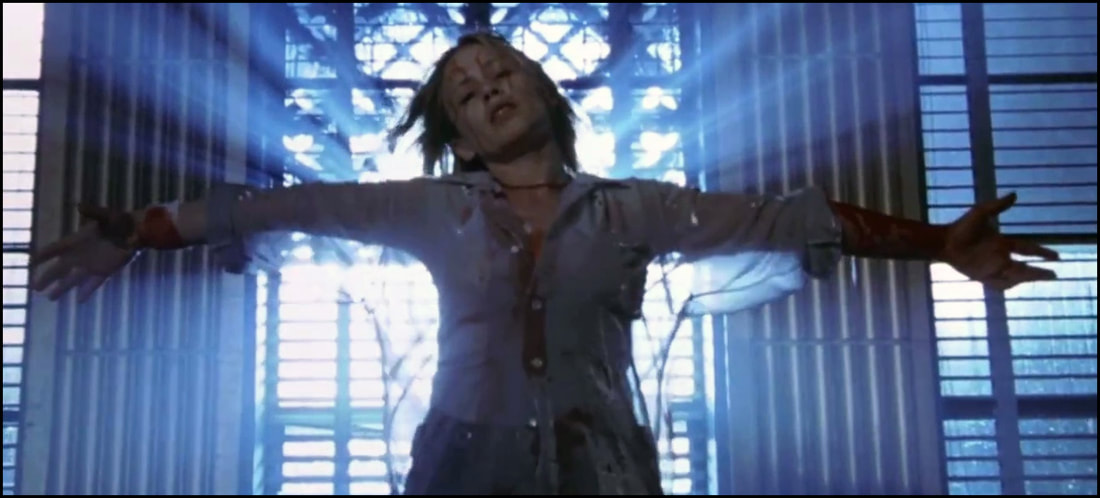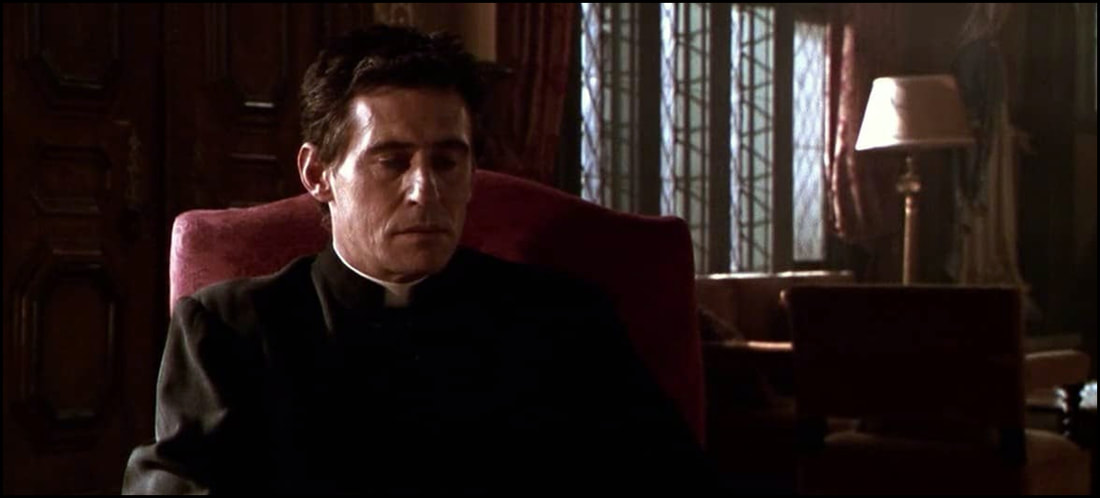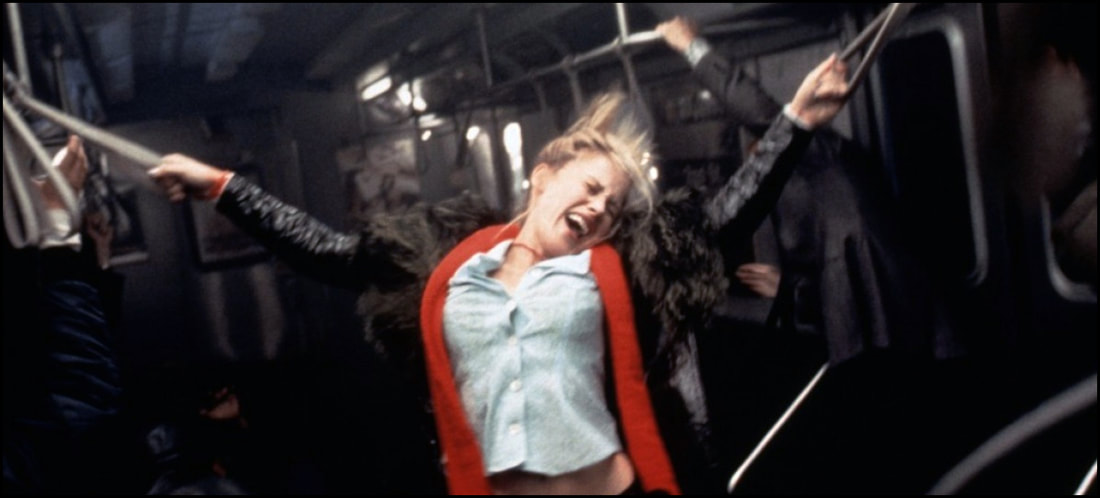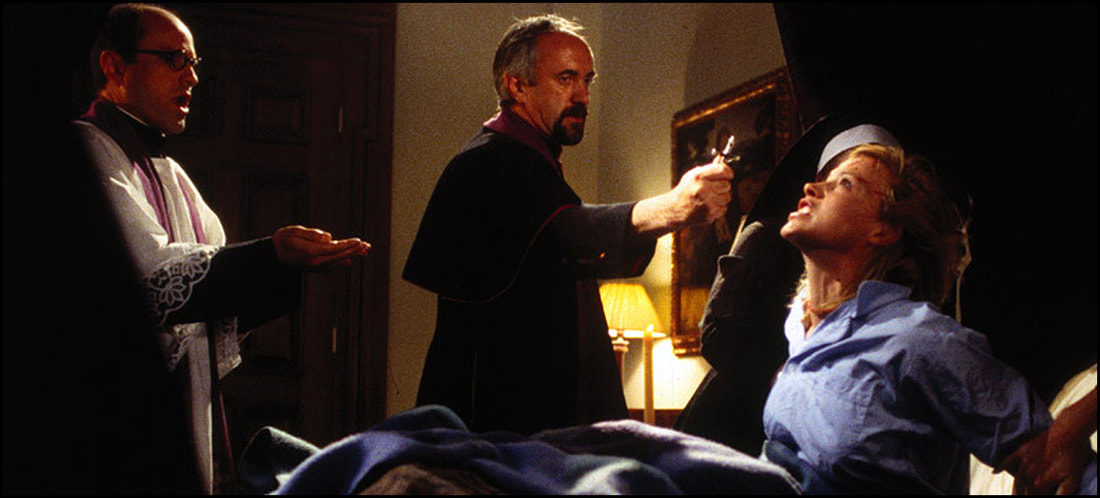While I might be even more accurate suggesting that Hollywood and their collective ilk prefer to attack people of a specific faith (i.e. the prophet Muhammad seems to be forever off limits), I’m fine with leaving that opening statement as is. Generally, I believe people rebel against that which they either disagree with philosophically or misunderstand heretically; and I’ve read enough about the behavior of Tinseltown giants – both onscreen and behind it – to know that their somewhat salacious and decadent lifestyles can be decisively at odds with what the faithful might accept. Worshippers and/or commoners are ‘the little people’ and will always suffer the wrath of the vengeful artistic elite, even if that means their pictures might underperform at the domestic box office. They still got their paycheck, mind you, so all’s well with the terrestrial High and Mighty.
But since 1973’s The Exorcist – a production that reinvented what screen Horror could be for a generation – Hollywood has been chasing that inescapable demon of catching lightning in a bottle. Studios have worked tirelessly to come up with something to match that winning formula of one part possession, one part religion, and one part realism. Realism, you see, is hugely significant because it helps ground the extraordinary within the ordinary world. But what elevates the William Peter Blatty script above the usual ruckus is the fact that its priests were actively doing God’s work, a sentiment today’s artistic elite can’t abide.
The end result of such bigotry – and, yes, it is bigotry – might be summed up nicely in a picture like Stigmata (1999). Scripted by Tom Lazarus (no, I’m not kidding) and Rick Ramage and directed by famed music video director Rupert Wainwright, the film is the story of Frankie Paige, a hairdresser who somehow personally endures the wrath of God despite not believing in him nor giving organized religion a second thought. Thankfully, there’s a man of science turned man of the cloth who risks both titles in an attempt to both explain the unexplainable and maybe rediscover his own lost faith along the way.
Why … it’s a match made on cinema heaven!
(NOTE: The following review will contain minor spoilers necessary solely for the discussion of plot and/or characters. If you’re the type of reader who prefers a review entirely spoiler-free, then I’d encourage you to skip down to the last few paragraphs for the final assessment. If, however, you’re accepting of a few modest hints at ‘things to come,’ then read on …)
“When a young woman becomes afflicted by stigmata, a priest is sent to investigate her case, which may have severe ramifications for his faith and for the Catholic Church itself.”
No, no, and no: I don’t like to rag on Hollywood for ragging on religion, but there are times when I think their obvious disdain of Christianity gets in the way of what might be an otherwise entertaining story. Like many of you, I can ignore political, ideological, or theological leanings in any work of art, and I can only do it if the pronounced bents aren’t pervasive. Frankly, I resent anyone ‘beating a drum’ in the middle of my escapism – and I think we all should be offended by such propaganda – so here’s looking at you, the cast and crew of Stigmata. You ruined an otherwise engaging though horrifically flawed idea.
Father Andrew Kiernan (played by Gabriel Byrne) works on behalf of the Catholic Church at debunking the various miracles that pop up around the globe. A recent trip to Brazil has the man particularly flummoxed as it would appear that authentic tears of human blood have been caught flowed from a statue of the Virgin Mary. The authorities in Rome – given personification here in the form of Cardinal Daniel Houseman (the generally stiff yet authoritative Jonathan Pryce) – are unwilling to accept such possibility; and they inevitably go so far as to dismiss the entire parish from the official records. Needless to say, Kiernan’s skepticism begins to grow even more pronounced when Houseman dispatches him to study the events surrounding Pittsburgh native Frankie Paige (Patricia Arquette), a hairdresser who seems to have come down with a case of stigmata.
Initially, the rational debunker asserts that – following Church doctrine – the young lady couldn’t possibly be undergoing such Biblical conversion because she’s a devout atheist. Stigmata, he insists, is a physical development predicated on the firmest of convictions to the teachings of Jesus Christ; and since the woman whiles away her days and nights between nothing more than working and clubbing she couldn’t conceivably be stricken by the Divine. But the more time he spends with the woman – ultimately seeing things he can’t explain up to and beyond the appearance of wounds on her body – Kiernan becomes convinced something spiritual is indeed afoot.
It’s precisely here where Stigmata’s universe begins to fall apart.
Frankly, I’m at a loss to understand the driving force behind Paige’s ‘possession.’ There’s a breakdown of logic consistently throughout Stigmata, so much so that I’m wondering precisely how this script got approved as is, though I can understand the ‘why’ pretty easy enough. It’s Horror – don’t you know – and Horrors tend to make money. All well and good, but did anyone even pause to think this one through?
Second: expanding upon the above, I can only assume that instead of experiencing authentic stigmata, Paige is instead being spiritually and/or supernaturally afflicted from the other side by some entity. The script clearly suggests at several points that this force is none other than the recently deceased Father Paulo Alameida (Jack Donner). While the story elaborates on precisely why Father Alameida might have a bone or two to pick with his Earthly bosses, mustn’t the audience suspend all level of disbelief to accept that a deceased man of God would assume the powers of a demonic entity to carry out an act of vengeance? What about all of that not harming the innocent? Did his faith teach him nothing? And how, pray tell, did he exactly infect Paige? Via his rosary? It’s their only connection, so? Erm … I hate to tell it to anyone, but possession isn’t exactly communicable that way from what I’ve read … but whatever.
Third: expanding upon the second above, if I accept that Father Alameida is the guilty culprit here, then what does his motivation really say about Christianity? It’s all ‘well and good’ until you find yourself on the receiving end of Catholic rejection, so instead of turning another cheek you wait until death, assume the powers of a demon, and then carry out your own campaign of retribution not against those who wronged you but destroy the life of an entirely innocent young woman all over a grudge? Writers Lazarus and Ramage are more likely the ones with an ax to grind here – not their creation – and they’re simply spinning yarn all in hopes that no one will notice the house of cards they’ve built isn’t even made of cards. It’s all smoke and mirrors – much like a healthy portion of the flick’s cinematography – which makes it as hollow as the institution they’re attacking … over its hollowness.
None of this even touches upon the holes in this particular universe that go beyond creed.
Somehow – and we’ve never told how – Paige maintains an expansive penthouse-style apartment in Philadelphia on little more than a hairdresser’s salary. Given the fact that the salon in which she works is never busy, one might even wonder how it stays afloat. Only in motion pictures would such a small and most likely privately-owned business offer its staff a healthcare plan that covers the extraordinary investment in medical and psychological services our leading lady requires – all because of these Godly shenanigans, you know – so don’t look for that aforementioned ‘realism’ to play all that much in this corner of the universe.
To their benefit, scribes Lazarus and Ramage imbue their lead female with some serious daddy issues as that’s the only likely reason I can muster to believe this free-spirited, club-hopping go-getter would consider Father Kiernan as a potential suitor. (A quick bit of Googling suggests a twenty-year age difference, so make of that what you will.) Their relationship is the biggest bit of artifice in all of this; and – to some degree – that’s a shame as Byrne makes the most of a few knowing glances at Arquette. The best she does in return is a somewhat stoic expression that barely hints of a smile somewhere under that disheveled womanhood.
Stigmata (1999) was produced by Metro-Goldwyn-Mayer (MGM), FGM Entertainment, and Instituto Nacional de Bellas Artes (INBA). DVD distribution (for this particular release) has been coordinated by the fine folks at MVD Visual Entertainment, Dark Sky Films, and Capelight Pictures. As for the technical specifications? While I’m no trained video expert, I found the sights-and-sounds to this Blu-ray release to be exceptional; there’s a great deal of visual post-production trickery at work here, but none of it fails on any level except for being occasionally confusing at to its particular meaning. Lastly, if you’re looking for special features? The disc boasts a 25-minute ‘making-of’ that’s pretty interesting though a bit light on specifics along with some deleted scenes, an alternate ending (honestly, much better and vastly more realistic than the theatrical one), the trailer, and an audio commentary from director Wainwright.
Alas … only mildly recommended.
Imperfect and more than a bit ideologically invested, Stigmata (1999) might look, sound, and feel like it was intended to be a late 1990’s recreation of The Exorcist (1973); but – rest assured – it wasn’t quite meant to be. I vaguely recall seeing this one originally on the big screen and being less than impressed, though I also believe its release may’ve been sandwiched between some like-minded fare that perhaps robbed a bit of the possible limelight. In all seriousness, I wanted to like it much more than I did, but perhaps that’s just the Devil in me speaking. This whole thing might have you asking, "Why, God, why?" for all the wrong reasons.
In the interests of fairness, I’m pleased to disclose that the fine folks at Capelight Pictures provided me with a complimentary Blu-ray of Stigmata (1999) by request for the expressed purpose of completing this review. Their contribution to me in no way, shape, or form influenced my opinion of it.
-- EZ





 RSS Feed
RSS Feed